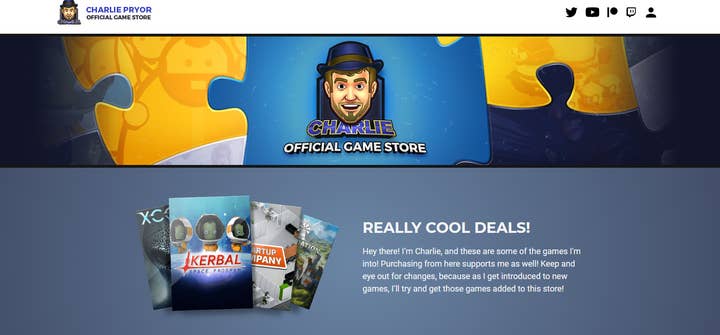Chrono.gg secures $5.5m to build its answer to the discoverability problem
CEO Justin Sacks explains why tackling the issues with PC storefronts means letting content creators make a whole lot more of them
Feeling fatigued by all the different PC storefronts out there? Justin Sacks certainly is. And he's trying to solve the problem in a surprising way: by making lots more of them.
Sacks is the CEO of Chrono.gg, a website that began a few years ago as a website offering a steep discount on a single game every day. That initial offering, Sacks tells GamesIndustry.biz, was designed to test a discoverability theory that would ultimately lead to the company's next major step.
"A lot of people are learning about games from their favorite content creators...But game publishers don't really know who's driving the sales for them"
"When we built Chrono, we basically had the same philosophy that we have now, which is that discovery in games has changed," he says. "The belief is that now, a lot of people are learning about games from their favorite content creators on platforms like YouTube and Twitch, or the communities that they're in, whether that's a Discord server or their friend group. But game publishers don't have any attribution. They don't really know who's driving the sales for them. And the people that are making those sales happen, they don't get credit or monetization. And so the original product launch of Chrono was to see if that was true.
"And turns out, it absolutely is true that these people really are the driving force of discovery in games. But the business model does not scale very well; we can only feature one game at a time, and we can only work with a handful of content creators. And these people play four or five different games a year, so we can only work with them every few months.
"So at the beginning of last year, we had this idea that seems very obvious now in retrospect: what would the world look like if we didn't make everyone go to our website, and if we didn't feature only one game at a time, and instead let the creators have their own store featuring all the games they love, and then their audiences can go there and buy those games? So that's what we tried to do."

The idea Sacks is describing is at the center of a new funding round backed by Pace Capital, BLH Venture Partners, Capital Factory, Courtside Ventures, and S3 Ventures to the tune of $5.5 million. The influx of cash is going toward the development of Chrono's new platform, which will allow streamers and content creators to make their own branded PC storefronts through which their fans can buy the games they've seen the creators play.
The project is currently in development, with Chrono "building test cases" visible on its webpage but not yet open for anyone to create their store. Sacks suggests it will likely be ready by Q3 of 2020, at which time content creators who sign up and are approved will be able to create their store by choosing a template, dropping in their branding and assets, and then choosing from a library of games they are interested in. Sacks compares it to a Shopify or Squarespace experience.
"It's basically our goal that whenever one of our partners who is building stores, whatever games they want to be featured, they should have access to"
The storefronts will effectively be platform-agnostic, with the ability for creators to include libraries of titles that will launch in whatever respective PC storefront they hail from: Steam, the Epic Games Store, Origin, and so forth. Sacks says Chrono has already worked with over 750 different game developers to secure content for the platform, ranging from indie creators to AAA publishers.
"It's basically our goal that whenever one of our partners who is building stores, whatever games they want to be featured, they should have access to," he says. "And so it's our job and our team to make sure that that we're working with all those different game publishers to make sure that that that access is there. Will it 100% be available at launch? Probably not. But we're aiming for about 80 to 90% of the desired content to be available."
I ask Sacks if this somewhat flies in the face of the problem he was originally trying to solve. One major pillar of the recent funding round is that the company wants to secure deals with plenty of AAA publishers to ensure that creators can include the biggest releases of the last several years in their stores. Is he concerned, then, that these will overshadow the indie titles Chrono once intended to spotlight?
"I think the most requested games will be the ones with the largest names and the widest appeal," he says. "But I think by removing some of the barriers to entry for the indie titles, and providing the axis of discovery to the creators, I think we'll still be able to help them much more. Like right now, discovery is just super tough. It's either a full luck of the draw if you just feature your game on Steam, or you have to pay a ton of money through marketing campaigns in order to get people's attention. But just by letting creators promote the games and act as a turnkey partner for them. I'm hoping it kind of levels the playing field a little bit."

One key component of Chrono's planned platform is the hook for content creators themselves: they get a cut of the profits when someone buys a game in the store. Sacks suggests the cut could range between 12% and 20% of the total sale, though the number hasn't been finalized yet. It's this hook that Sacks hopes will drive interest in the platform and help spread the word throughout communities of content creators.
He adds that Chrono isn't necessarily courting any specific major figures in an attempt to bolster or promote the platform at launch, but thinks referrals and word of mouth will be enough -- just as it was for Chrono's initial game-a-day offering.
"There are not very many things that work for content creators that actually drive monetization"
"There are not very many things that work for content creators that actually drive monetization," he says. "Like if you're on Twitch, 90% plus of the dollars you get are direct support from your audience. And if you're on YouTube, 90% plus are the ads that live on the content but nowhere does commerce fit in at all. And so we think just by building that infrastructure, that piece of commerce will spread on its own."
And though at launch Chrono will be limited to premium games, Sacks suggests there will be an opportunity for free-to-play games or paid games with microtransactions to make use of the service in the future, too. It's just a matter of making the deals with publishers, and then sorting out the complexities of technology to make those purchases "count" for Chrono users.
"What if your favorite creator plays, for example, League of Legends and they use all these skins -- what if you could buy that person's favorite skins and support them at the same time? We don't have that available just yet; that's like that requires very direct partnerships and integrations with the publishers. But it's something that we're really excited about."
Ultimately, Sacks recognizes the irony inherent in trying to solve the discoverability problem by making more places to discover things. But he's hopeful that by leaning into the results of Chrono's original game-a-day experiment that suggest word-of-mouth is the actual way people learn about games, its new platform will help, rather than harm, the ecosystem.
"It's sort of true that in order for this to work, we have to create yet another place where people go to buy the game. But hopefully, it's the really natural one because the reason that they learned about something and decided that they're excited about it is the same place where they can go and buy it. And I think being platform-agnostic helps with that."
